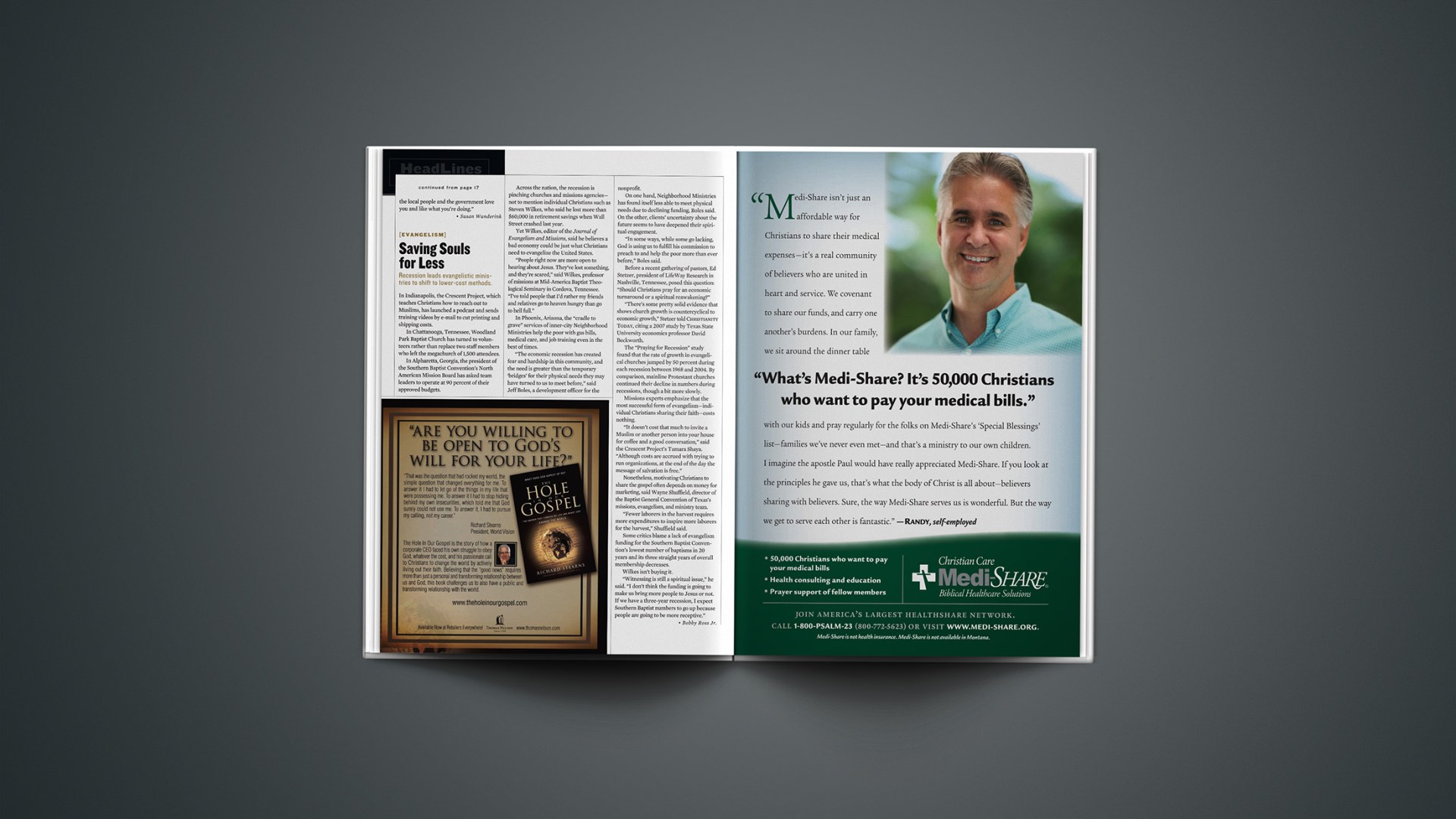In Indianapolis, the Crescent Project, which teaches Christians how to reach out to Muslims, has launched a podcast and sends training videos by e-mail to cut printing and shipping costs.
In Chattanooga, Tennessee, Woodland Park Baptist Church has turned to volunteers rather than replace two staff members who left the megachurch of 1,500 attendees.
In Alpharetta, Georgia, the president of the Southern Baptist Convention’s North American Mission Board has asked team leaders to operate at 90 percent of their approved budgets.
Across the nation, the recession is pinching churches and missions agencies—not to mention individual Christians such as Steven Wilkes, who said he lost more than $60,000 in retirement savings when Wall Street crashed last year.
Yet Wilkes, editor of the Journal of Evangelism and Missions, said he believes a bad economy could be just what Christians need to evangelize the United States.
“People right now are more open to hearing about Jesus. They’ve lost something, and they’re scared,” said Wilkes, professor of missions at Mid-America Baptist Theological Seminary in Cordova, Tennessee. “I’ve told people that I’d rather my friends and relatives go to heaven hungry than go to hell full.”
In Phoenix, Arizona, the “cradle to grave” services of inner-city Neighborhood Ministries help the poor with gas bills, medical care, and job training even in the best of times.
“The economic recession has created fear and hardship in this community, and the need is greater than the temporary ‘bridges’ for their physical needs they may have turned to us to meet before,” said Jeff Boles, a development officer for the nonprofit.
On one hand, Neighborhood Ministries has found itself less able to meet physical needs due to declining funding, Boles said. On the other, clients’ uncertainty about the future seems to have deepened their spiritual engagement.
“In some ways, while some go lacking, God is using us to fulfill his commission to preach to and help the poor more than ever before,” Boles said.
Before a recent gathering of pastors, Ed Stetzer, president of LifeWay Research in Nashville, Tennessee, posed this question: “Should Christians pray for an economic turnaround or a spiritual reawakening?”
“There’s some pretty solid evidence that shows church growth is countercyclical to economic growth,” Stetzer told Christianity Today, citing a 2007 study by Texas State University economics professor David Beckworth.
The “Praying for Recession” study found that the rate of growth in evangelical churches jumped by 50 percent during each recession between 1968 and 2004. By comparison, mainline Protestant churches continued their decline in numbers during recessions, though a bit more slowly.
Missions experts emphasize that the most successful form of evangelism—individual Christians sharing their faith—costs nothing.
“It doesn’t cost that much to invite a Muslim or another person into your house for coffee and a good conversation,” said the Crescent Project’s Tamara Shaya. “Although costs are accrued with trying to run organizations, at the end of the day the message of salvation is free.”
Nonetheless, motivating Christians to share the gospel often depends on money for marketing, said Wayne Shuffield, director of the Baptist General Convention of Texas’s missions, evangelism, and ministry team.
“Fewer laborers in the harvest requires more expenditures to inspire more laborers for the harvest,” Shuffield said.
Some critics blame a lack of evangelism funding for the Southern Baptist Convention’s lowest number of baptisms in 20 years and its three straight years of overall membership decreases.
Wilkes isn’t buying it. “Witnessing is still a spiritual issue,” he said. “I don’t think the funding is going to make us bring more people to Jesus or not. If we have a three-year recession, I expect Southern Baptist numbers to go up because people are going to be more receptive.”
Copyright © 2009 Christianity Today. Click for reprint information.
Related Elsewhere:
Our economic crisis special section has more news and commentary on the recession and related issues. See also our section on money & business.










